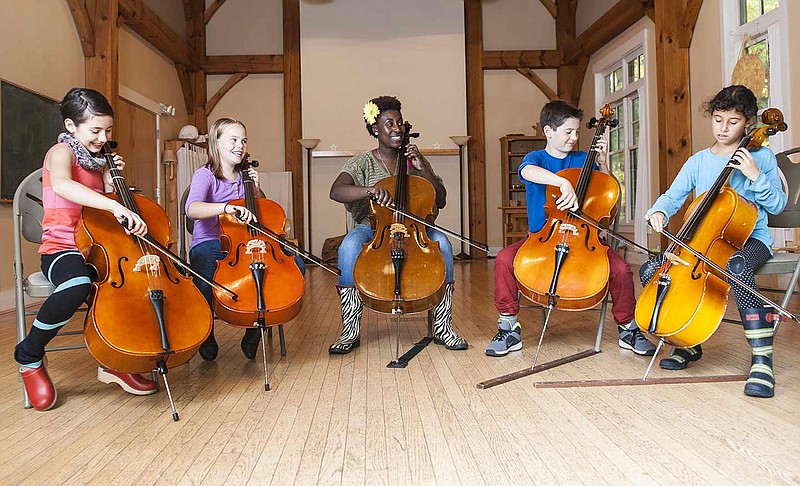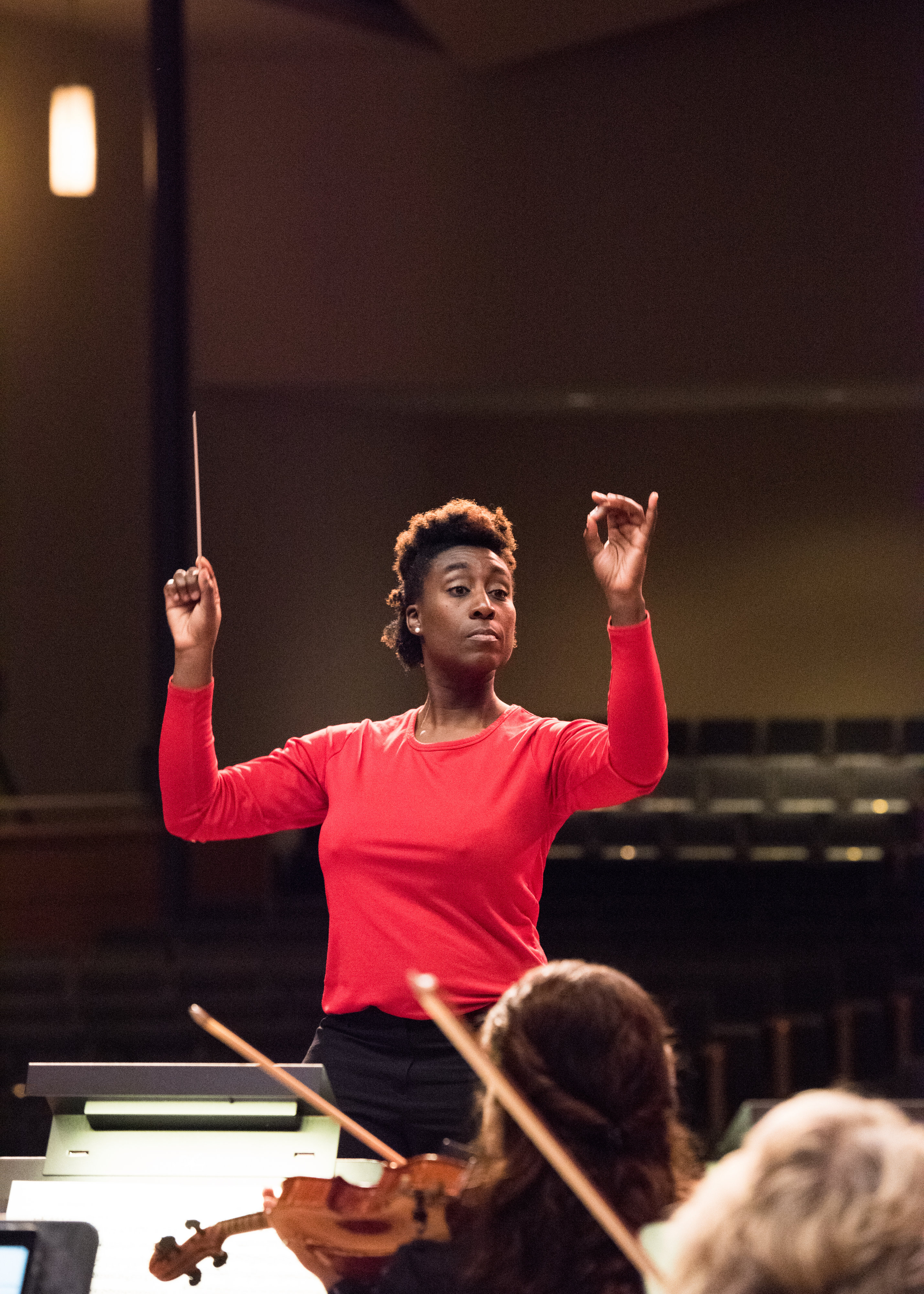Music has always been a part of Marshunda Smith's life, so it is no surprise that it would become her vocation. Still, she says it surprises some new acquaintances to hear she is a cellist and symphony conductor. Smith lives and works in Boston, where she has conducted the North Shore Philharmonic Orchestra and co-founded the No-Name Orchestra.
"When they meet me and I tell them I play music, they say, 'Oh, do you sing gospel?' " she says with a big laugh. "I guess it's because I'm African-American."
Smith, 38, laughs a lot during a nearly 60-minute conversation. She has a friendly, outgoing personality and says she understands some of the stereotypes since she's been dealing with them most of her life. She points out that only about 5 percent of professional symphony conductors are female and even fewer are African-American, for example.
But symphonic music pulled her in from a young age. While other kids were listening exclusively to Usher or Beyoncé, Smith and her best friend and fellow symphonic music lover Lauren Goss, a violinist, also made time for Bach and Beethoven.
She remembers being driven to college visits by Goss' father, Lewis, listening to classical music on the car radio.
"So we'd be in the van and some classical piece that we had just learned would come on, and she would be singing her violin part at the top of her lungs, and I'm singing my cello parts at the top of my lungs. It was so much fun."
She laughs at the memory and adds, "We had our R&B, our rap or whatever, but what we loved was finding the groove. There is a groove in symphonic music that you can find, and that's what we did. It was so much fun having your best friend also like the same music."
She says it could also have its challenges, especially among people in her own community.
"It could also be annoying because you had these two black girls loving classical [and] when we would tell people we liked music, they assumed we were into gospel. That I sang gospel. I can't sing anything.
"Or they thought we were stuck up, or that we thought we wanted to be white, or that we were better than anyone else.
"I just love that groove."
Smith and Goss were more than just friends; they became business partners, creating two-thirds of a trio that played weddings and parties to help pay for college.
"She was always very motivated," Lauren's mother, Sherrye, says of Smith. "She didn't allow things to happen to her. She made them happen, even putting together her own college scholarship portfolio and pursuing it herself."
Smith came by her love of music naturally. Her grandmother, Catherine Alexander, was a vocalist with the Four Roosters along with Sam Gooden, Richard Brooks and Arthur Brooks. That group went on to become The Impressions, which later featured Fred Cash, also from Chattanooga, and the late Curtis Mayfield.
While she could always play music, Smith says she was also good at mathematics as a child and thought that might become her vocation. Then biology stepped in. Or, more specifically, a young man named Omar.
Smith says her grandmother played piano in church and Smith would get up in front of the church and talk.
As a sixth-grader at Chattanooga School for the Arts and Sciences, Smith decided to join the band. All of the saxophones were taken, however, so she went to her second choice, the flute. Then she decided to try the bass, and that lasted about two months.
That's when nature entered the picture.
"Then I wanted to play cello because Omar played the cello, and I figured if I did too, I could be in the room with Omar."
Omar eventually faded away, but the cello didn't.
Smith first attended the University of Tennessee at Chattanooga, but was later offered a scholarship to study music at UT-Knoxville. After UTK, she began teaching music to students at Oak Ridge High School. The experience changed the course of her life.
Smith says she was a student with a bad attitude while at CSAS, so when she saw how giving and helpful the music students at Oak Ridge were to struggling fellow students, it inspired her to teach and to become a role model.
She used to take symphony works and chop them up and have the students put them back together as an exercise, and that got her thinking about being a conductor.
"I saw these kids offering to stay after school to help a classmate and I thought, 'This is a ninth-grader, or a 10th-grader. I saw this all the time. I didn't want to teach because I was a little snot with a bad attitude, and I didn't want to teach kids with bad attitudes, but these children changed my mind."
That led her to pursue her master's degree in orchestral conducting with an emphasis on music education. After doing some research, she landed at the University of Southern Maine in "the whitest state in the country," she says with a big laugh.
She got her degree and after being ticketed for the third time by the same police officer for speeding - the last time after pulling into her neighborhood - she moved to Boston. She is currently the co-principal cellist of the North Shore Philharmonic Orchestra.
Earlier this year, she became the second female in 20 years and the first African-American to conduct the orchestra in its 70-year history.
Smith says she got emails and notes from numerous women, especially older women who told her how great it was to see a woman conducting an orchestra.
She also co-founded the No-Name Orchestra of Boston, which gives musicians a chance to play a concerto or other solo work with a full orchestra.
Now in its third year, the orchestra puts together a group of musicians, soloists and conductor who play a piece with no rehearsals. They simply get together and play the piece.
One of her next goals is to present a new piece by a woman while conducting an all-female orchestra.
She hopes to one day return to her hometown and perhaps play with or conduct the Chattanooga Symphony & Opera and would very much like to speak to students here. Being a role model is a big part of who she has become, Smith says.
She says that last week she was walking down the street with her cello when an older black man stopped her with a smile and asked what she was carrying.
"I told him it was a cello and he said, 'So you play classical music? That is so great to see another person of color playing this music.'
"So representation matters. If you can see someone who looks like you doing something that matters, that just opens your mind to the idea that you could do it."
Contact Barry Courter at bcourter@timesfreepress.com or 423-757-6354.

